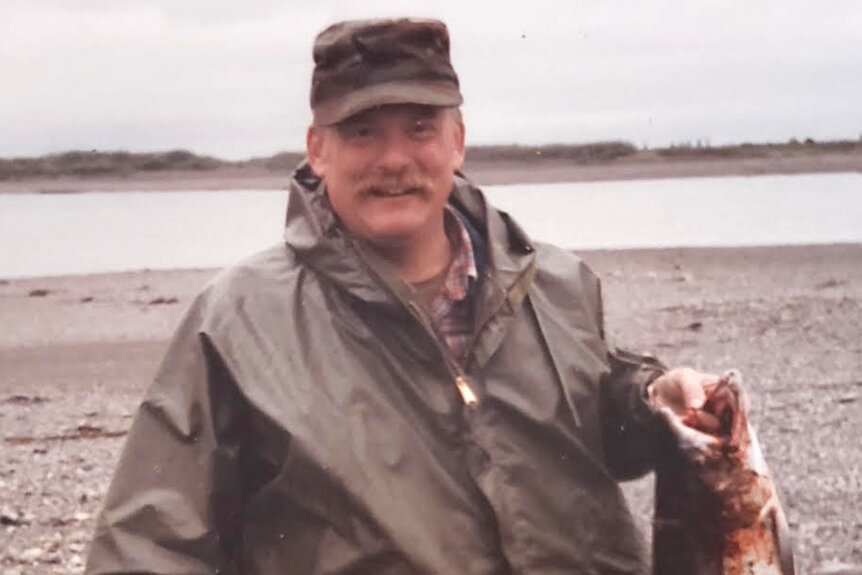Create a free profile to get unlimited access to exclusive videos, breaking news, sweepstakes, and more!
Alaskan Man Organizes Car Explosion To Get His Romantic Rival Out Of The Picture
Investigators quickly zeroed in on Jim Wheeler as a suspect in a horrifying explosion — but discovering who exactly built the bomb wasn't as easy.
Hank Dawson loved living in Alaska. In fact, he told his sister he would never live in "the lower 48" ever again. Unfortunately, he would never even get an opportunity to change his mind.
On the morning of October 18, 1993, in Wasilla, a small suburb of Anchorage, residents heard a loud explosion. Shortly after, a report came in of a vehicle fire at the Alaska Army National Guard Alcantra Armory Complex.
"As I pulled into the facility, I could see what was left of a truck that was totally devastated," Jack Krill, a former fire chief with the Mat-Su Fire Department told "Fatal Frontier: Evil In Alaska," airing Sundays at 7/6c and 8/7c on Oxygen. "
The car was still on fire, so rescuers worked to extinguish it while still preserving any necessary evidence. The license plate was still somewhat intact, and a wallet was found in the vehicle. Both the plates and the wallet helped confirm that the victim was Hank Dawson.
Hank worked for the Alaska National Guard. "He certainly had access to all kind of armory stuff including explosives. We kind of thought maybe Hank had something in his truck that went off," Gene Belden, a retired sergeant with Alaska State Troopers, told producers.
But evidence of a remote-controlled detonation device was soon found at the scene. It became obvious someone had purposefully set off the bomb, and that it was a homicide.
Dawson's family was shocked anyone would have wanted to hurt him. He was the middle child in a military family that moved around a lot, and as such became good at making friends.
"Hank was a pro at meeting people. He never met a stranger. He had a smile that was infectious and a laugh that was amazing," sister Melinda Gilbert told producers.
Dawson was with the Texas Highway Patrol for about a decade before an opportunity arose to join the Alaska National Guard. He absolutely loved it, and he loved Alaska. There he met his wife, Terri, who had a small child.
But the marriage wasn't exactly in a strong place. About a week after Dawson was killed, a man named Gary Dudley contacted police. He said his friend Jim Wheeler had made some strange statements right before the murder.
Wheeler, a retired military police officer, lived right next door to Dawson. According to Dudley, the Dawsons were having financial issues and it put a strain on their marriage. Terri had turned to Wheeler for comfort.
"We learned from Dudley that Mr. Wheeler was coming over and seeing her and he was consoling her," Belden said.
Wheeler was soon head over heels for Terri and wanted to marry her. Allegedly, Terri had indicated that if Hank Dawson wasn't in the picture, she would marry Wheeler, Dudley said.
Investigators talked to Terri, who confirmed she and Wheeler had had a romantic relationship, but insisted she wanted to stay with Dawson. She said they had been working on their marriage.
Dudley agreed to help investigator get a confession from Wheeler. They bugged his home, and had him invite Wheeler over to talk. Wheeler admitted to paying someone to set up a bomb, all because he was in love.
"We were shocked [to learn about Wheeler] because what we all knew was that Wheeler was a friend to Terri and Hank," Gilbert told producers.
Wheeler was quickly arrested, but he refused to reveal who had made the bomb.
Investigators knew they were looking for someone who had experience with explosives, so they cross-referenced Wheeler's telephone book. Eventually, they recognized the name Robert Geiger. Geiger worked in mining claims — and had a mining license that would allow him to purchase explosives.
They put together a photo lineup and went to only place in the area they knew of that sold explosives. The clerk quickly picked out Geiger's photo and confirmed he recently bought dynamite, even finding the receipt.
Authorities knew they had to locate Geiger. They spoke to his girlfriend, who told them he had come home with some money, loaded his van and left for Washington state.
Geiger was apprehended soon after in Everett, Washington. He made a full confession, admitting he made the bomb and that he and Wheeler put it in Dawson's vehicle, followed him to remote area, and detonated it when he wasn’t near anyone so they wouldn't harm bystanders.
Geiger claimed Wheeler operated the remote control, while Wheeler insisted Geiger did. Either way, both men were charged with homicide.
However, the case hit a snag when Geiger's counsel claimed the confession, which hadn't been recorded in full, was coerced. Because the recorded confession didn't include his Miranda rights, it was ruled inadmissible.
Without the confession, all prosecutors had left was a name in a notebook, proof Geiger bought dynamite, and that after the explosion he had a lot of money.
His case was thus turned over to federal prosecutors, who got to work building a case against him. They searched his home and found a carjacking tool among his belongings, as well as a receipt proving he bought it right before the murders, as well as other bomb-making materials.
He was hit with several federal charges: malicious destruction of a vehicle used in and affecting interstate commerce (Dawson's car was being leased by Ford Motor Credit in Michigan, and the company now couldn't make money off the lease), using and carrying a firearm in connection with a crime of violence, and possession of a destructive device.
He was found guilty on all three charges and sentenced to life in prison as well as an additional 30 years.
Meanwhile, on October 11 1994, Jim Wheeler's case went to Alaska State Court. Wheeler was found guilty of first-degree murder and given the maximum sentence in Alaska, 99 years in prison.
For more on this case and others like it, watch "Fatal Frontier: Evil In Alaska," airing Sundays at 7/6c and 8/7c on Oxygen, or stream episodes here.



















